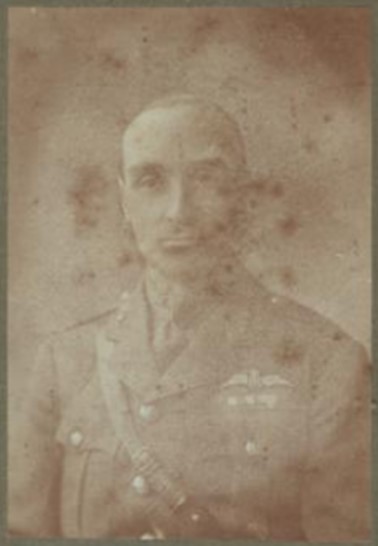‘The Man with The Plate in His Head’: Jack Mitchell (1889 – 1966)
08/05/2025 - 3.05
Cian Manning
Jack Mitchell was an all-round sportsman who was interested in cricket, rugby and soccer. A retrospective piece in the News & Star says that Mitchell was a Captain in the First World War. During which, he fell from a plane and was spared death by landing in a tree. After the accident, he needed a plate placed in his head, so he was given the nickname he would use for the rest of his days.
We know that John Mitchell, a watchmaker based in Waterford, and his wife Lizzie had a baby boy named Jack on 16th November 1889 at Manor Street. Jack attended the Protestant Bishop Foy's School in the townland of Grantstown, as his family lived on Bath Street (just off the east side of the street where he was born). The ‘Blue School’ had a proud sporting tradition until its closure in 1967, and it appears that Mitchell was a boarder there. One such student was Dungarvan’s George Henry Cooke, who played cricket and rugby for the school before joining the Indian civil service.
The ‘Bould Jack,’ as he was known in his youth, joined the British Army in 1906 and initially served as a member of the Royal Flying Corps. Mitchell was a Sergeant in the Irish Guards and promoted to Second Lieutenant in the early years of the First World War. In 1915, he had a steel plate put in his head and was considered unfit to fly. This led him to number the soldiers of the 28th Battery of Royal Field Artillery. According to local legend, Mitchell fell out of the plane and landed in a tree by a one in a million chance.

Jack Mitchell. Author's Collection
The Waterford man was made captain of the Royal Artillery a year after his near-death experience. Mitchell was called ‘The Captain’ in his native city. He should have been known as ‘The Man With Many Nicknames’! Mitchell was awarded the Military Cross for ‘conspicuous gallantry’ at the Battle of Shaik Saad in Mesopotamia in 1916. It was the first of a series of assaults by the Tigris Corps to breakthrough Ottoman lines to relieve the besieged garrison at Kut (a town 160 kilometres south of Baghdad). Mitchell’s wife received the following letter after he got the Military Cross:
Dear Mrs. Mitchell,
I must write to tell you how delighted I was at your husband getting the Military Cross, it was so well deserved. I am sure you must be very proud of him as we all are. It was mainly for the attack on the 17th January at Shaich[sic] Sand. He was some distance in front of the charge and directed the fire so well that our infantry took the trenches with hardly a casualty.
Following his receipt of the MC, Mitchell served for five years in Cairo before returning to his native city around 1923. Mitchell was not limited to his military career while in the British Army in England or further afield. He played for Reading and Leicester as a centre-half, while he could be counted on as an opening batsman for Hampshire County Cricket Club. Upon his return to Waterford, he played cricket and rugby, which he would later coach at Newtown school. While in Cairo, Mitchell managed to become squash champion of Egypt for three consecutive years.
He was a member of the first committee of the Waterford & District Junior League in 1924 and was part of the O’Connell Celtic squad who were by far the strongest team in the early years of the Junior League. His teammate was Tommy Arrigan, who later led Waterford FC to their first Free State Cup victory in 1937, over St. James’s Gate. Leading players of rival teams in the locality joined O’Connell Celtic to form Waterford Celtic, who entered the Munster Senior League. An important club in the history of the city by the River Suir, not only playing senior football but also signing cross-channel professionals such as left-full Billy Hoss and inside-left Davy Haywood. Another star was centre-forward Jack Doran, who served in the 17th Middlesex Regiment (1st Football Battalion). He previously played for Newcastle United, Norwich City, Brighton & Hove Albion and Manchester City. Doran received three caps for Ireland in the early 1920s.
Mitchell combined soccer with playing rugby (he would referee both sports) and captain a Grantstown XI in cricket in the mid-1920s. In July 1927, he scored 84 runs in what was his highest total for the season. Journalist Leo Dunne said that Mitchell was a ‘polished bat[ter] and great fielder.’ But civilian life wasn't always easy for Mitchell. On 28th April 1928, he was involved in a fatal car accident and charged with manslaughter at a special court in New Ross, Co. Wexford. After a hockey match, Mitchell was driving through County Wexford with Mr W.F. Watt (in the latter’s car, who was considered one of Ireland’s leading tenors) when they reached Carrigbyrne, where a group of young men were playing marbles on the road. The driver sounded the horn to warn the crowd to move. The Munster Express said that Nicholas Walsh, a 20-year-old son of a labourer who lived in a cottage outside New Ross, had:
…appeared to have been suffering from deafness. Instead of jumping out of the way of the car, the unfortunate youth apparently jumped right into the centre of the road in front of the oncoming car.
He was knocked down, the car passing over his body, inflicting terrible injuries…
The car stopped 88 yards away from where the young man was hit. Walsh was taken to a nearby cottage, while Mitchell and Watt searched for a doctor and a priest in New Ross. The youth only lived for a few hours after the accident. Walsh had suffered a broken leg and a fracture to the base of his skull. After Mitchell was charged with the fatality, he was granted bail at £200, which was paid by Watt and Frank Phillips, with the pair splitting the payment.
The inquest into the accident took place in an open field and lasted 90 minutes, with nearly 20 witnesses examined. Both Watt and Mitchell were represented by Peter O'Connor and H.J. Kenny. According to Watt's testimony, one of the ladies in their party was suffering from a headache and sat in the backseat with him. The Munster Express detailed:
They saw the boys ahead of them on the road, and when within about 80 yards of them the driver sounded a long, loud blast on the horn. He said he remembered this particularly, because the lady suffering from headache started up and asked what was that? The car went on, and when about ten yards from the boys the deceased stepped out towards the grass margin and the driver went on, taking it for granted that he had a clear road. When just about a yard and a half from the boys, who were in a crouching attitude, the deceased suddenly leaped into the middle of the road in front of the car. The driver swerved and accelerated to try and clear him, and he had then to make a counter swerve in order to avoid the ditch, with the result that the car swayed a good deal and the driver could not apply the brakes, fearing it would turn over.
It was stated that the car was going from 25 to 30 miles when they first saw the group of boys, but speed was reduced as they approached them. Mitchell, who had been driving for 12 years, agreed with Watt. The jury concluded that the accident may have been avoided if ‘…there had been better control of the car, or if the horn had been sounded in proper time.’
Mitchell helped Waterford Celtic to become Waterford FC and play in the League of Ireland. He played for the Blues in their first match in the League of Ireland on 2nd November 1930, which they lost 3-1. He continued to be involved with the club after he stopped playing soccer, as a trainer and secretary. Mitchell often plays rugby and referees soccer games in the same weekend. He was tasked with overseeing a Free State Shield tie between Cork and Drumcondra at the Mardyke in October 1935. Cork supporters attacked the ref, who was forced to be escorted to a pavilion by Civic Guards, ‘amid a shower of sticks and stones.’
Mitchell's enthusiasm for sports was passed on to his children, especially in the game of hockey. His son William, known as ‘Dilly ’, played for the Church of Ireland Club in Cork and was capped for Munster in a hockey match against Connacht in 1952. Jack beat his son John in the final of the annual billiards handicap at the Waterford Y.M.C.A. Hall in May 1949 by a score of 150 to 102. His later years were spent in Sallypark, a town that disappeared over the course of the 20th century as the railway industry declined. Mitchell died in early March 1966 aged 76. He was considered the ‘doyen of Waterford sportsmen’ by the Munster Express, as mourners gathered for his service at Christchurch Cathedral and burial at the cemetery on John's Hill.
Biography
Cian Manning is an independent researcher based in Ireland’s oldest city, Waterford. He has previously authored Waterford City: a history (2019) and ‘I Love Me County’: Waterford Sporting Stories (2024) for The History Press. To mark the centenary of the Waterford & District Junior League, Cian wrote a history of the local soccer league, titled ‘Our League’: Waterford & District Junior League, A Centenary, in 2024. Additionally, he is a frequent contributor to Ireland’s Own, Munster Express and WLR FM. Cian can be contacted on e-mail at - camanning93@gmail.com



/prod01/wlvacuk/media/departments/digital-content-and-communications/submitted-news-images/Smelting-knife.png)
/prod01/wlvacuk/media/departments/digital-content-and-communications/images-2024/250630-SciFest-1-group-photo-resized-800x450.png)
/prod01/wlvacuk/media/departments/digital-content-and-communications/submitted-news-images/Way-youth-zone-August.JPG)
/prod01/wlvacuk/media/departments/digital-content-and-communications/images-2024/Arthi-Arunasalam-teaser.jpg)
/prod01/wlvacuk/media/departments/digital-content-and-communications/submitted-news-images/Muslim-woman-playing-football.jpg)
/prod01/wlvacuk/media/departments/digital-content-and-communications/submitted-news-images/Business-School-800x450.jpg)
/prod01/wlvacuk/media/departments/digital-content-and-communications/submitted-news-images/University-of-the-Year.jpg)